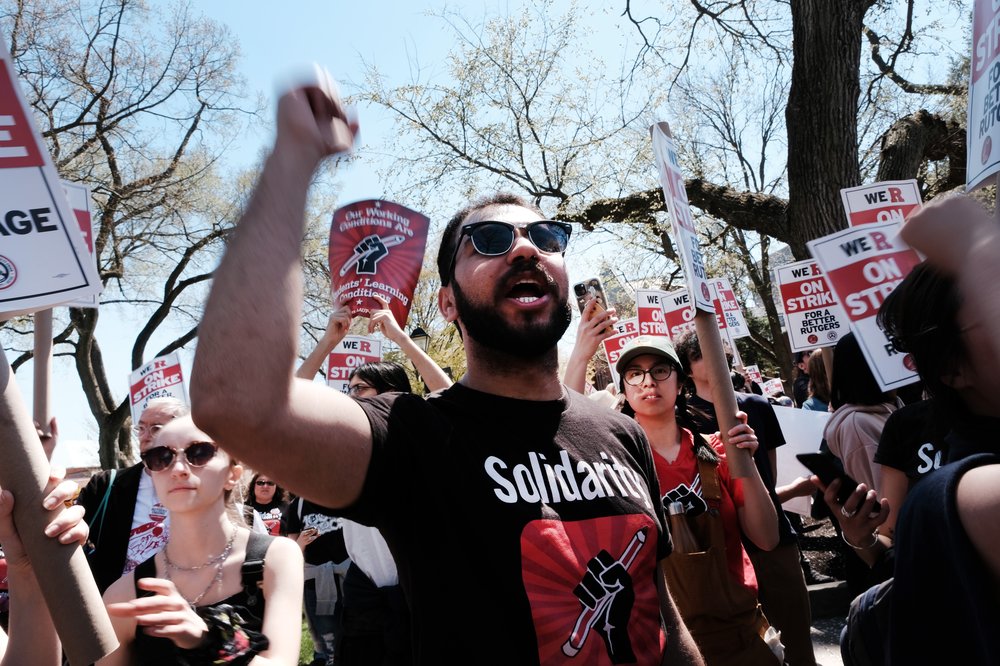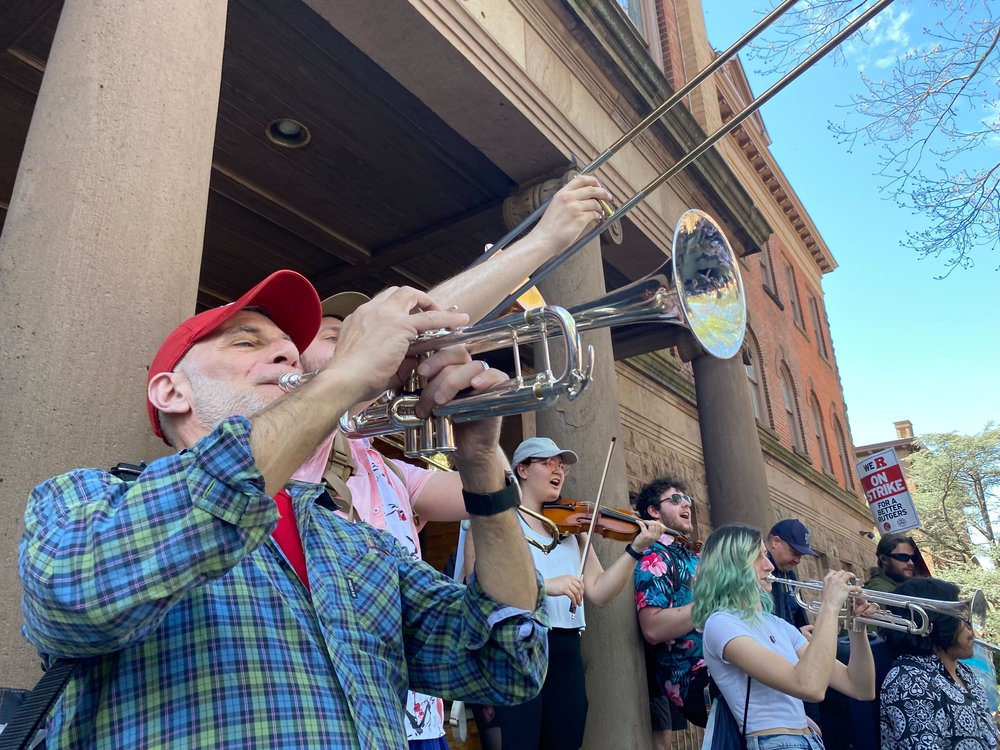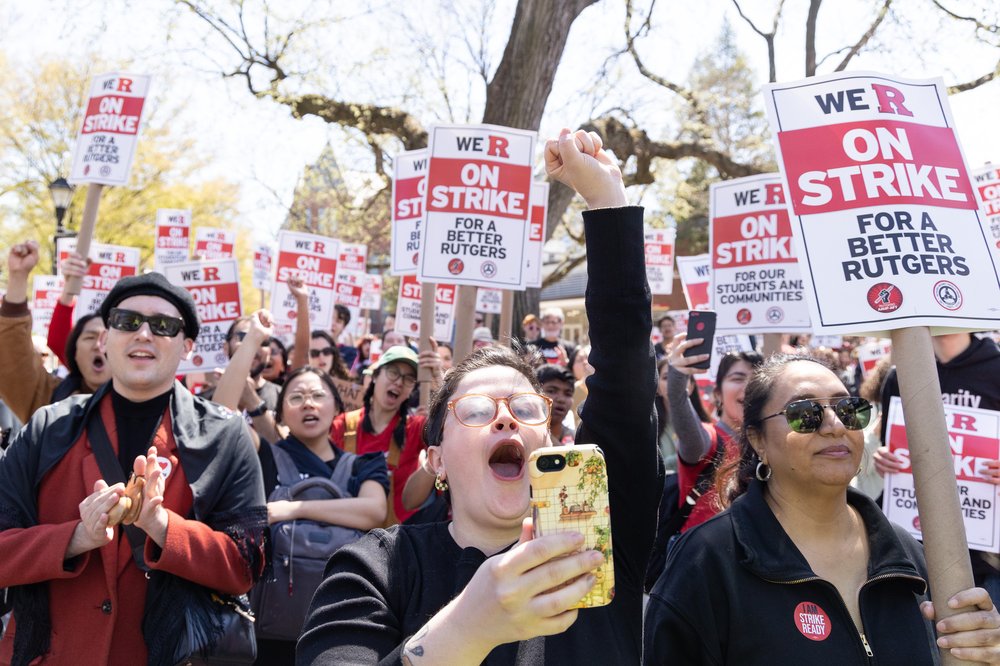Rutgers faculty strike suspended — classes for 67,000 students resume Monday
April 15, 2023, 2:03 a.m.
New Jersey Gov. Murphy and negotiators say they've got a framework for a deal. More details are still coming.

The Rutgers University faculty strike is suspended after five days, and students will return to class Monday.
Early Saturday, separate announcements from New Jersey Gov. Phil Murphy’s office, the striking unions and the Rutgers administration announced that a “framework agreement” was reached for new faculty contracts. The announcement comes after marathon negotiating sessions every day since the strike began Monday.
Yet the unions warned in their own announcement the agreement only prompted a "suspension" of their strike, and said it could resume if they're not satisfied as the details of a tentative agreement are worked out. There were still issues to resolve, particularly for members represented by the Rutgers AAUP-Biomedical and Health Sciences of New Jersey — "and we won’t leave our colleagues at RBHS behind,” the statement said.
According to the university, the deal calls for significant increases to the rates paid to graduate workers and adjunct faculty members — the part-time lecturers the unions estimate teach about 30% of classes. It would also “significantly strengthen” job security for the adjuncts, university President Jonathan Holloway said in the school’s announcement. Adjuncts currently have to reapply for their jobs each semester; Holloway’s announcement didn’t say specifically what about that practice might change.
The walkout paralyzed the state’s flagship university, serving 67,000 students, for five days. Demonstrators marched and rallied all week long at Rutgers’ campuses in New Brunswick, Camden and Newark, often joined by hundreds of supportive students.
“After five days of intensive dialogue and negotiations in my office, I am pleased to share that the Rutgers University and union bargaining committees have come to an agreement,” Murphy said in an announcement released at 1:30 a.m.
Three faculty unions overwhelmingly voted to strike in March after working without a contract since June and said the university was ignoring their demands. The three unions — the Rutgers AAUP-AFT, Rutgers Adjunct Faculty Union and Rutgers AAUP-Biomedical and Health Sciences of New Jersey — represent 9,000 faculty, part-time lecturers, graduate workers, postdoctoral associates and physicians.

Murphy called the framework agreement a “fair and amicable conclusion." Holloway and union leaders alike credited the governor for his involvement.
Murphy called both sides to the State House on Monday as the first faculty strike in Rutgers' 256-year-history began. Faculty members had been operating without contracts since last summer.
Rutgers AAUP-AFT President Becky Givan, in the governor's announcement, said the framework “sets in place unprecedented gains for contingent workers, graduate students and our communities."
Amy Higer, president of the Adjunct Faculty Union that represents part-time lecturers, said the framework would be “the basis for a transformative contract for part-time faculty at Rutgers” — and included key union goals such as multi-semester appointments for hundreds of us and significantly higher pay for all of us.”
“We still have work to do to come to a full tentative agreement, and we will resume doing so next week,” she said. “Most of all, we are eager to get back to teaching our students and helping them finish up [their] spring semester.”
The three unions said once a tentative agreement is reached, members would vote on it in a secret ballot.
Terms announced so far
Under the framework agreement, full-time faculty and Educational Opportunity Fund counselors would see raises of at least 14% by July 1, 2025, Holloway’s announcement said.
Adjunct professors’ per-credit rates for each class they teach would increase 43.8% over the course of four years. Under the adjuncts’ last contract, they earned a base pay of $5,799 for a three-credit course, with some lecturers earning up to $7,234 per course. The unions had said they wanted adjunct members to be paid comparably, per credit, to full-time non-tenured full-time faculty — and previously said their goal was $10,000 for a three-credit course.
The university agreed to increase minimum salaries for postdoctoral fellows and associates by 27.9% over the contract as well. And it said it would both increase wages and commit to “multi-year university support for our teaching assistants and graduate assistants.”
Those graduate assistants, currently paid about $30,000 for 10 months of work, would see their salaries increase to $40,000 over the course of the contract.
The university’s announcement didn’t address all the issues union members have described as part of their negotiations. But the unions, in their announcement, said they’d also won job security improvements for adjuncts and non-tenure-track faculty, union representation for graduate fellows, “common good demands to center our students and communities” and “full-time faculty control over teaching conditions."
None of the announcements specifically addressed unions' earlier demands for Rutgers to freeze costs in all housing it controls, or a $15 campus-wide minimum wage — measures that could have benefited students directly.

Murphy didn’t address in the late-night announcement whether he’d be providing additional funds to Rutgers to help meet union demands, as he suggested he might do on Tuesday’s episode of “Ask Governor Murphy." But in nightly updates to members, union leaders seemed to acknowledge extra state funds were on offer. Rutgers currently gets about 20% of its $5.1 billion budget from the state.
Unions had estimated a $20 million price tag for one of their core demands — fractional pay for adjuncts, essentially paying a fraction of what non-tenured full-time professors earn, rather than on a per-credit basis.
But the university’s description of increased pay for adjuncts still seemed to be describing it in terms of per-credit salaries. CUNY labor historian Joshua Freeman said granting part-time lecturers fractional pay isn’t very common among universities.
“It's not unusual to say, look, you know, there's such a huge, ridiculously big discrepancy,” Freeman said. But he said that’s usually addressed by increasing compensation per course rather than explicitly tying it to a proportion of other faculty pay.
The unions had also said they wanted to boost graduate worker pay from $30,000 to $37,000. While the final figure of $40,000 by the end of the contract exceeds that, it wasn’t clear from the university’s announcement how big of an increase graduate workers would see immediately.
Thursday night, the unions reported winning another key concession — longer-term contracts for non-tenure-track professors. Each re-appointment would carry a longer contract term than the last. A professor’s fifth appointment would be considered “presumptively renewable,” Carla Katz, a negotiator for the unions, said at the time. She said that would mean a professor would only be denied reappointment for good cause.
Returning to normal, for now
In Holloway’s announcement, he encouraged instructors to be flexible with students as they return to classes. The school hadn’t made any specific pronouncement about how academic progress — including toward graduation, which is just a few weeks away — would be handled.
He said students should get in touch with their instructors about any missed work.
Commencement ceremonies, set to begin May 13, would continue as planned. So would fall registration.
Holloway was the target of much of the unions’ ire after he wrote a university-wide email in March threatening to seek an injunction to stop professors from picketing. Unions also objected to him keeping David Cohen, a former head of employee relations under Republican Gov. Chris Christie, among his lead negotiators. Christie had a notoriously contentious relationship with public worker unions, particularly the state’s largest teaching union, the New Jersey Education Association.
Another union representing 2,500 administrative staff at Rutgers University instituted a strike pledge this week. The pledge is a way of gauging members' support for a potential strike, but doesn't automatically authorize a walkout.
This is a developing story and will be updated. An initial version of this story described the strike as “over,” but unions have clarified it is “suspended” and could resume if they’re unsatisfied with talks over a final agreement. This story has also been updated to correct the spelling in one reference to Rutgers president Jonathan Holloway's name.
'Hey! Holloway!' I want to know how the catchy Rutgers strike song happened.